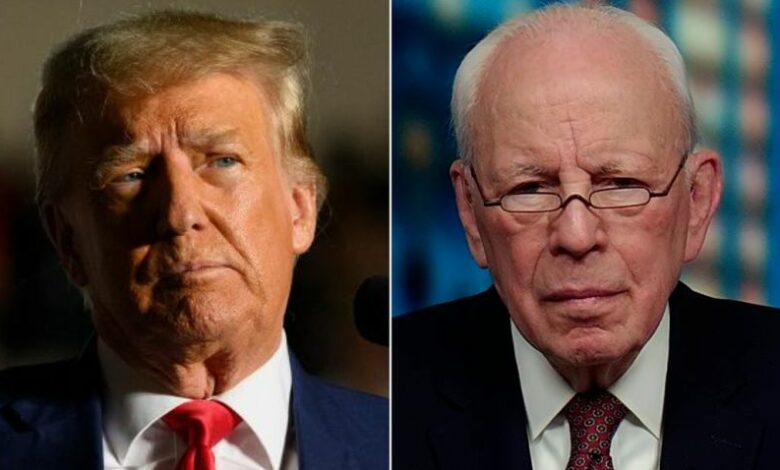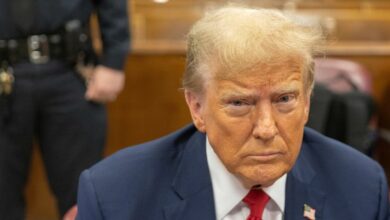
Maine pitched the 2024 election into deeper chaos and constitutional confusion Thursday by becoming the second state to throw Donald Trump off the ballot over the January 6, 2021, US Capitol riot.
The move from the Maine secretary of state – following a similar decision from the Colorado Supreme Court earlier this month – worsened a growing crisis for Trump’s campaign and strengthened the rationale for the US Supreme Court to take up the issue, arising from the 14th Amendment’s “insurrectionist ban.” It has already exacerbated the havoc already surrounding the election and could cement ever wider national divides.
The increasing uncertainty urgently needs a resolution, with Iowa poised to kick off voting in the Republican nominating race on January 15 and other key ballot deadlines looming. Maine Secretary of State Shenna Bellows, a Democrat, paused her decision pending a potential appeal in state court, which Trump’s team said they intend to file.
The decision came on the same day that Trump’s ascendant rival in New Hampshire, Nikki Haley, tried to stop her gaffe over slavery from turning into a momentum-killer.
The idea that a presidential candidate cannot plainly state in 2023 that the enslavement of humans is what tore the country apart more than 160 years ago is stunning in itself.
But the drama surrounding the former South Carolina governor less than three weeks before voting starts is also having the effect of easing the scrutiny on Trump — who has caused many more scandals and outrages during his gravity-defying political career, many of which are related to the 2020 election denialism behind his swirling legal exposure.
Maine’s decision only deepened the unprecedented legal and political tangle surrounding the 2024 campaign – all of which stems from Trump’s refusal to accept defeat and his historic challenge to the fabled US transfer of power. After all, two states have now found that a former president engaged in an insurrection against the US government – an unheard of state of affairs at any other moment in history.
The controversy, however, also raises new questions over whether efforts to make Trump pay for January 6 are justified on the grounds of protecting America’s democracy from a uniquely pernicious challenge or could backfire politically against President Joe Biden and Democrats next fall. The multiple criminal charges Trump is facing have tended to hike his popularity among base voters even if his wild anti-democratic conduct in 2020 could be a major general election liability.
Republican presidential candidate Chris Christie told “CNN This Morning” on Friday that actions like those in Colorado and Maine make the former president a “martyr.”
“While there may be – people may think there’s a justification for doing this, it’s not good in our democracy. In the end, Donald Trump should be defeated by the voters at the polls and defeated by someone like me, who is willing to tell the truth about him,” he said.
‘Democracy is sacred’
Bellows wrote in her decision that the circumstances were so outlandish that the Constitution left her no choice but to disqualify the Republican front-runner from the ballot.
“I do not reach this conclusion lightly,” Bellows said. “Democracy is sacred … I am mindful that no Secretary of State has ever deprived a presidential candidate of ballot access based on Section Three of the Fourteenth Amendment. I am also mindful, however, that no presidential candidate has ever before engaged in insurrection.”
Trump’s team lashed out in response, with the former president demanding that the country protect the the exact foundational American privilege that he tried to destroy three years ago — the right of voters to choose their president.
“We are witnessing, in real-time, the attempted theft of an election and the disenfranchisement of the American voter,” Trump’s campaign said in a statement. “Democrats in blue states are recklessly and un-Constitutionally suspending the civil rights of the American voters by attempting to summarily remove President Trump’s name from the ballot.”
The claim is richly ironic, since Trump is still denying the result of the 2020 election, which was followed by his attempt to disenfranchise voters, including in key swing states that voted for Biden. Trump’s false claims of voter fraud were thrown out of multiple courts and denigrated by his administration. But that has not stopped him from putting them at the center of his 2024 campaign, which has become a vehicle for accusing Biden of the very transgression which Trump perpetrated – election interference.
The dramatic news from Maine also emerged hours after an exclusive CNN report revealed fresh details of the extent of the ex-president’s election meddling in early 2021. Recordings showed that Trump advisor Kenneth Chesebro said the Trump camp got “freaked out” that fake elector ballots were stuck in the mail days before Congress was due to certify the result of the election. Arrangements were swiftly made to get them to Washington on January 5 to bolster a scheme to declare Trump the rightful president in which then-Vice President Mike Pence refused to participate.
The new evidence further undermined Trump’s latest and increasingly far-fetched legal defense – that his frantic efforts to stay in the White House in fact represented a proper use of presidential power to protect voters after a fraudulent election.
Haley fights to stabilize her campaign
The ever-widening reverberations of Trump’s behavior in 2020 unfolded Thursday alongside another extraordinary controversy – over Haley’s failure to name slavery as the cause of the US Civil War.
Haley’s misstep — and her somewhat clumsy efforts to clean it up — revived unflattering criticisms that have trailed her during her career, including an impression that on issues like race and the Civil War, she has often equivocated about history’s truths for her own political gain.
The controversy is also a reminder of the scrutiny of a presidential campaign since it came in her first event back on the campaign trail after her Christmas break and is allowing her rivals to argue that she’s not ready for the biggest political stage. While her comments may not be a big deal in deep red state primaries, they could complicate her effort to win over independent voters who can join the GOP primary in New Hampshire and who she needs to help her trim Trump’s lead in the polls. The Granite State has a proud record of sending regiments to fight the Confederacy in the Civil War.
Haley’s rivals tried to capitalize on her discomfort. Florida Gov. Ron DeSantis, who earlier this year was stuck in a controversy over the teaching of slavery in his state’s schools, declared that she “is not a candidate that’s ready for prime-time.”
“The minute that she faces any type of scrutiny, she tends to cave,” he said.
And Christie seized on her troubles to bolster his refusal to bow out of the race. “I’ll make it easy for you. If someone asked me what the cause of the Civil War was … It’s easy, it’s slavery,” Christie said in New Hampshire on Thursday. “I’ve been really fair to Nikki, but let me say this, she’s smart,” he added. “She didn’t say what she said last night and today about this because she’s dumb. She’s not. She’s smart, and she knows better.”
What the Trump legal morass and Haley’s troubles have in common
Haley’s troubles and Trump’s legal morass tell a tale about the modern Republican Party.
Haley’s refusal to talk openly about the obvious, historic implications of slavery appeared to be an attempt to appease hardline conservative voters in a party that has marched far to the right in recent years. She has been similarly reticent to openly confront Trump over his attempt to overturn US democracy in 2020, apparently to avoid alienating voters who have bought into the ex-president’s falsehoods about the election.
While Haley’s discomfort is far from over, Trump’s legal shadow is also darkening though his campaign is taking steps to challenge his ballot disqualifications.
The Republican Party in Colorado has already challenged the state Supreme Court’s decision to bar him from the ballot over the 14th Amendment.
In Maine, the Trump campaign said it would quickly file a case in state court to stop the “atrocious” decision from taking effect.
But Bellows argued that she had the authority to disqualify Trump over his conduct.
“The oath I swore to uphold the Constitution comes first above all, and my duty under Maine’s election laws … is to ensure that candidates who appear on the primary ballot are qualified for the office they seek,” she said. Bellows wrote that the challengers presented compelling evidence that the January 6 insurrection “occurred at the behest of” Trump – and that the US Constitution “does not tolerate an assault on the foundations of our government.”
Before Colorado, several other states, like Michigan and Minnesota, rejected similar efforts. And California’s secretary of state released a certified list of candidates Thursday night that included the former president. The fact that different states now have a divergent view of the Constitution and Trump’s eligibility to run again means that it is almost incumbent on the US Supreme Court to step in, even if wading into this political tsunami could further expose an institution that has been battered politically in recent years to further strain.
Two key questions will be before the justices. First, whether the constitutional ban on insurrectionists holding office also applies to the president. Second, the top bench will be under pressure to rule on whether a single state can simply decide that a candidate engaged in an insurrection without offering them due process.
This story has been updated with additional information.




